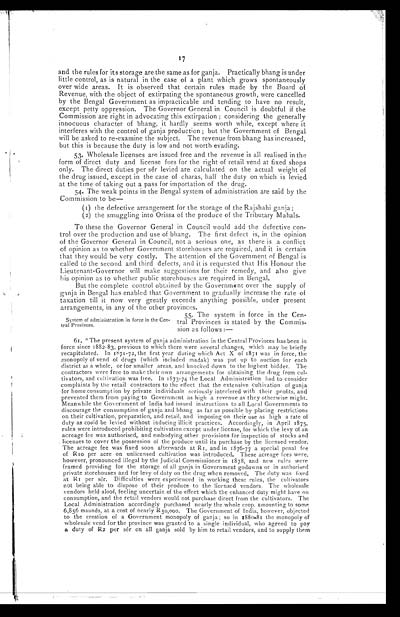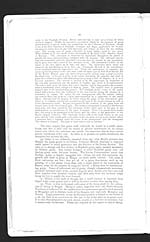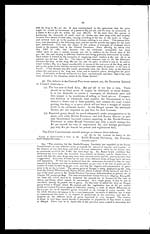Medicine - Drugs > Resolution. No. 1369 Ex. > Resolution. No. 1369 Ex.
(21) Page 17
Download files
Individual page:
Thumbnail gallery: Grid view | List view

17
and the rules for its storage are the same as for ganja. Practically bhang is under
little control, as is natural in the case of a plant which grows spontaneously
over wide areas. It is observed that certain rules made by the Board of
Revenue, with the object of extirpating the spontaneous growth, were cancelled
by the Bengal Government as impracticable and tending to have no result,
except petty oppression. The Governor General in Council is doubtful if the
Commission are right in advocating this extirpation; considering the generally
innocuous character of bhang, it hardly seems worth while, except where it
interferes with the control of ganja production; but the Government of Bengal
will be asked to re-examine the subject. The revenue from bhang has increased,
but this is because the duty is low and not worth evading.
53. Wholesale licenses are issued free and the revenue is all realised in the
form of direct duty and license fees for the right of retail vend at fixed shops
only. The direct duties per sér levied are calculated on the actual weight of
the drug issued, except in the case of charas, half the duty on which is levied
at the time of taking out a pass for importation of the drug.
54. The weak points in the Bengal system of administration are said by the
Commission to be—
(1) the defective arrangement for the storage of the Rajshahi ganja;
(2) the smuggling into Orissa of the produce of the Tributary Mahals.
To these the Governor General in Council would add the defective con-
trol over the production and use of bhang. The first defect is, in the opinion
of the Governor General in Council, not a serious one, as there is a conflict
of opinion as to whether Government storehouses are required, and it is certain
that they would be very costly. The attention of the Government of Bengal is
called to the second and third defects, and it is requested that His Honour the
Lieutenant-Governor will make suggestions for their remedy, and also give
his opinion as to whether public storehouses are required in Bengal.
But the complete control obtained by the Government over the supply of
ganja in Bengal has enabled that Government to gradually increase the rate of
taxation till it now very greatly exceeds anything possible, under present
arrangements, in any of the other provinces.
System of administration in force in the Cen-
tral Provinces.
55. The system in force in the Cen-
tral Provinces is stated by the Commis-
sion as follows:—
61. "The present system of ganja administration in the Central Provinces has been in
force since 1882-83, previous to which there were several changes, which may be briefly
recapitulated. In 1871-72, the first year during which Act X of 1871 was in force, the
monopoly of vend of drugs (which included madak) was put up to auction for each
district as a whole, or for smaller areas, and knocked down to the highest bidder. The
contractors were free to make their Own arrangements for obtaining the drug from cul-
tivators, and cultivation was free. In 1873-74 the Local Administration had to consider
complaints by the retail contractors to the effect that the extensive cultivation of ganja
for home consumption by private individuals seriously interfered with their profits, and
prevented them from paying to Government as high a revenue as they otherwise might.
Meanwhile the Government of India had issued instructions to all Local Governments to
discourage the consumption of ganja and bhang as far as possible by placing restrictions
on their cultivation, preparation, and retail, and imposing on their use as high a rate of
duty as could be levied without inducing illicit practices. Accordingly, in April 1875,
rules were introduced prohibiting cultivation except under license, for which the levy of an
acreage fee was authorised, and embodying other provisions for inspection of stocks and
licenses to cover the possession of the produce until its purchase by the licensed vendor.
The acreage fee was fixed soon afterwards at R1, and in 1876-77 a special penal fee
of R10 per acre on unlicensed cultivation was introduced. These acreage fees were,
however, pronounced illegal by the Judicial Commissioner in 1878, and new rules were
framed providing for the storage of all ganja in Government godowns or in authorised
private storehouses and for levy of duty on the drug when removed. The duty was fixed
at R1 per sér. Difficulties were experienced in working these rules, the cultivators
not being able to dispose of their produce to the licensed vendors. The wholesale
vendors held aloof, feeling uncertain of the effect which the enhanced duty might have on
consumption, and the retail vendors would not purchase direct from the cultivators. The
Local Administration accordingly purchased nearly the whole crop, amounting to some
6,856 maunds, at a cost of nearly R 50,000. The Government of India, however, objected
to the creation of a Government monopoly of ganja; so in 1880-81 the monopoly of
wholesale vend for the province was granted to a single individual, who agreed to pay
a duty of R2 per sér on all ganja sold by him to retail vendors, and to supply them
Set display mode to: Large image | Zoom image | Transcription
Images and transcriptions on this page, including medium image downloads, may be used under the Creative Commons Attribution 4.0 International Licence unless otherwise stated. ![]()
| India Papers > Medicine - Drugs > Resolution. No. 1369 Ex. > Resolution. No. 1369 Ex. > (21) Page 17 |
|---|
| Permanent URL | https://digital.nls.uk/74934079 |
|---|




